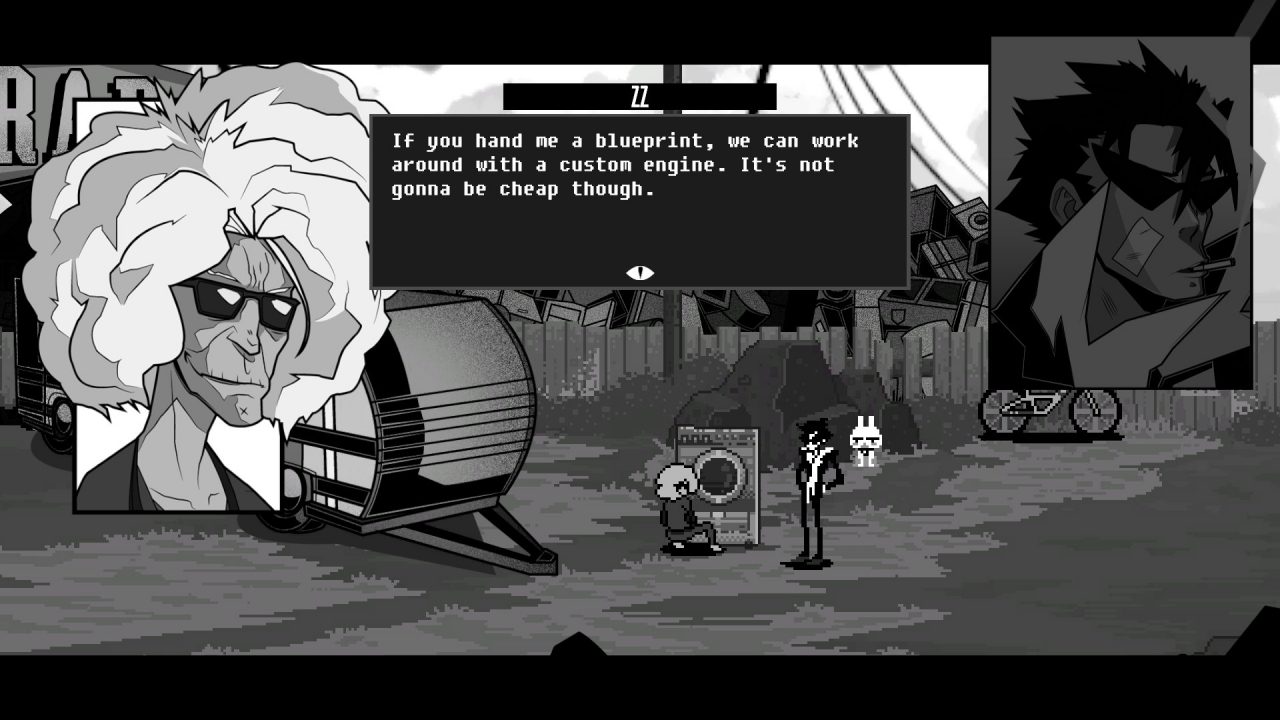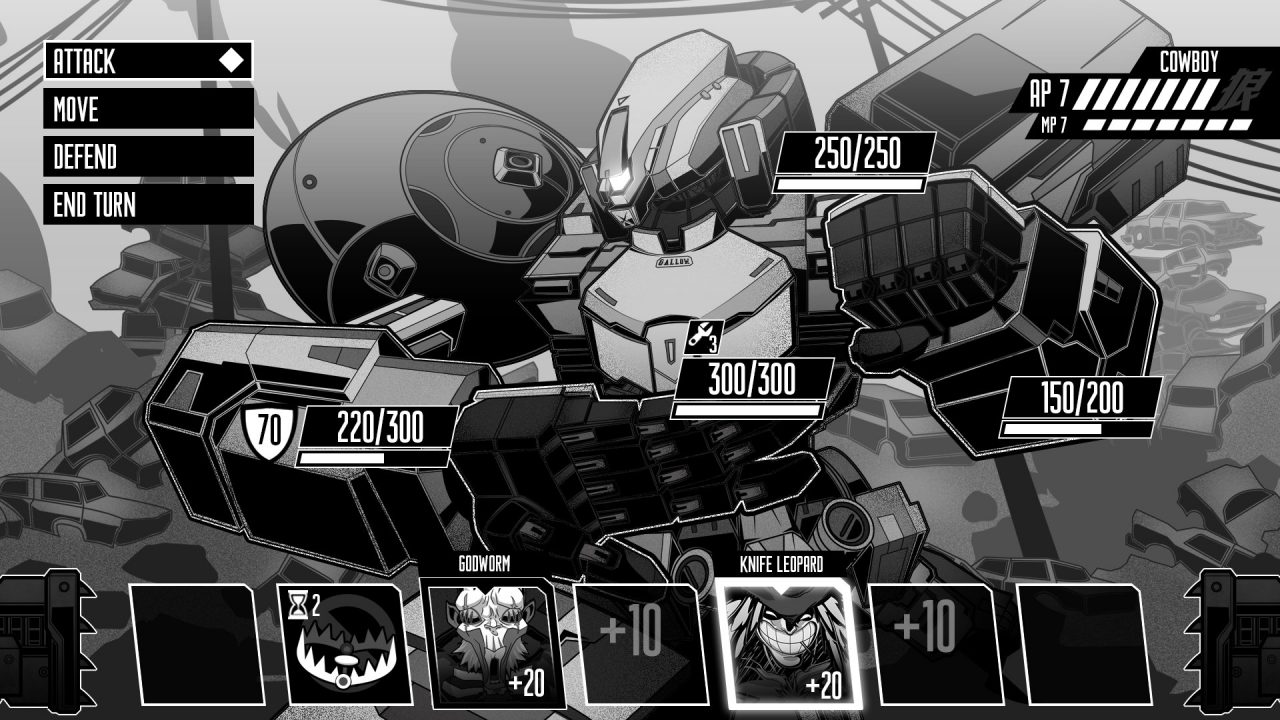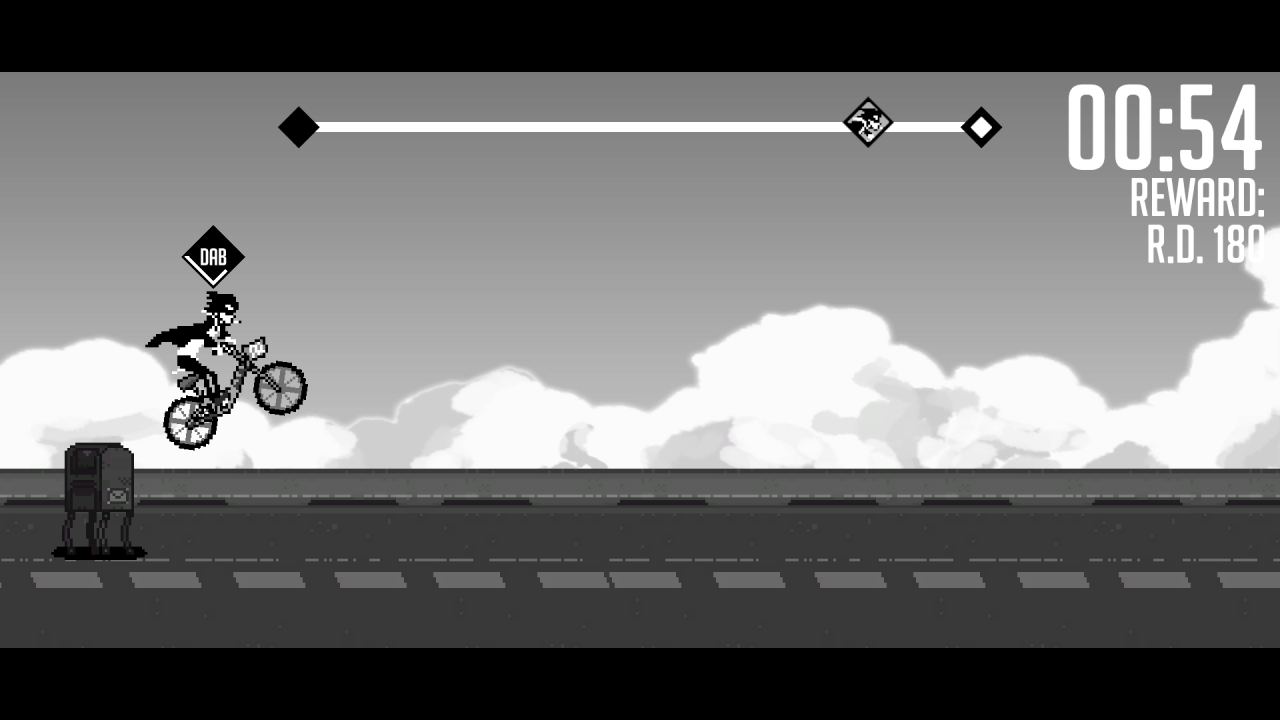Wolfstride is a difficult game, but not in the traditional sense. Sure, battles can be challenging and choosing the wrong build for your giant mechanical gladiator can ruin the best-laid battle plans, but that’s not the biggest conflict one feels when playing the stylish RPG battler from OTA IMON Studio. Instead, it’s the conflict in your head: am I head over heels in love with this game, or do I absolutely hate it?
Wolfstride makes a lovely first impression. Stark black-and-white graphics merge with Peak ’90s Cool Anime style and deep one-on-one battles between beautifully designed mechs. The style and story evoke classics like Cowboy Bebop and The Big O, but with a notably fouler mouth. The opening hour of Wolfstride is fast paced, throwing you between mech battles that feel big and in media res action. As Shade, an ex-yakuza with an incredibly checkered (and initially vague) past, you navigate dangerous interactions with some of Shade’s acquaintances while helping get your team’s giant mech Cowboy ready for the Ultimate Golden God tournament. Your crew is a ragtag bunch made up of ex-cons and misfits. This mech tournament is their one chance to hit it big, go (relatively) straight, and kick off a new, better life.

Unfortunately, tonal whiplash is a barrier to investing in these characters. Most of the crew starts out intentionally unlikable, and for some, their story arcs aren’t quite enough to shake that initial impression. The worst offender by a large margin is a somewhat faulty training robot named Peepoo. Unfortunately, this name is exactly as juvenile as you think, and it’s core to your experiences with a character who appears in most of your crew’s conversations. This is a problem because, in what would otherwise be a mark in the win column, a lot of the dialogue in Wolfstride is voice acted. Most performances are excellent, adding dimensionality to these characters that would be absent in text-only interactions. Peepoo, on the other hand, has an already high-pitched voice that regularly kicks into overdrive. Peepoo has what’s first defined as a censorship circuit to deal with his worst language. Realistically, this means that at least one word out of every sentence he speaks gets replaced by the voice actor shouting “PEEEEEEEE” at the top of their lungs. This is painful for headphone users, but also underlines the biggest weakness in Wolfstride’s narrative.
While described on its store page as an “immature grown-up RPG,” it doesn’t really follow through on the latter. F-bombs litter the dialogue in weirdly inappropriate places, and nearly every character in the game acts wildly aggressive and angry toward every other character. Instead of feeling like a “grown-up RPG,” it feels closer to what a child thinks grown-ups sound like. It’s distracting throughout the entire story and regularly takes impact away from story scenes that would otherwise feel moving, occasionally even poignant.
Regardless of tonal whiplash, the presentation of these cutscenes ends up feeling smooth thanks to wonderful character art and occasional full-screen art cut-ins. Alongside the mostly-stellar voice acting, these scenes make the entire experience feel deliberate in its look. Visual cohesion is a strength, despite melding relatively simple sprite work with smooth animation and static hand-drawn art. But while the story is the game’s focus, the mech battles are truly the star of the show.

Mech battles are one-on-one turn-based affairs. The simple basis forms a strong foundation for plenty of depth. Mechs are placed along a 2D plane with seven spaces, with distance from your opponent, distance from walls, and special boosting spaces all factoring into positioning. It gets more complicated from there, with each mech featuring four or more hit areas. Only the core in the torso must be defeated to win the match, but destroying limbs takes away both defensive and offensive options from your opponents. Of course, you’re subject to the same rules. As a result, matches are a thoughtful balancing act, knowing when to defend damaged spots, when to repair, and when to spend your ammo on a tempting opening. Both your mech and pilot are highly customizable, allowing you to make your favorite build that’s best at your preferred range and to prepare for specific opponents by swapping out abilities between fights.
But again, the pendulum swings here. This customization is satisfying, and the battles have some real heft, even if they lose some of their novelty deeper into the story. Unfortunately, you’ll end up wishing you spent more time battling. Instead, odd jobs in a system named BDSM (Boy who Delivers Special Messages), another example of the kind of humor you encounter at every turn, take up most of your time. For the most part, these odd jobs play like even more simplified, repetitive versions of the odd jobs from No More Heroes, with some feeling more suited to a virtual pet than an RPG. Very simple controls facilitate mindless tasks ad nauseam when preparing for your next tournament match.
At no point are these tasks particularly fun, but without many ways to make money, they’re essential. Furthermore, your game is on a 60-day timer with tournament matches and events at set days throughout. The time limit isn’t a big impediment to finishing the game, but structurally it leaves some unpleasant experiences. Each day you set out to do quests or odd jobs, and each day you must run through the same half dozen areas to get to the next repetitive task. Each area has a large, mostly-empty space before the location you actually want to get to. So a lot of time is spent just watching Shade run through barren streets, with a dull minigame waiting at the end.

Ultimately, that blend exemplifies the entire experience in Wolfstride. There are good ideas at work with the combat, style, and interesting story twists. But for everything it does right, it does two things wrong. Whether it’s aggravating attempts at comedy, tasks that feel like a chore, or a tone that just can’t decide what it wants to be, there is always something standing between you and the ideal experience. So really, your experience will be defined by how much you can enjoy, or at least tolerate, the worst parts. There’s gold in them thar hills, but you’ll have to dig through a ton of peepoo to get to it.


